- Home
- Alex Archer
The Pretender's Gambit Page 3
The Pretender's Gambit Read online
Page 3
Just as Calapez was about to knock again, a man’s voice answered from the other side. “Hello. Can I help you?”
“Police.” Calapez spoke with an American accent, hiding his native Portuguese. Doing something like that was not hard to do after watching bootlegged American movies. He had been a good mimic since he’d been a child.
“I didn’t call the police.”
“We know that, sir.” Calapez curbed his anger. Tonight had already been frustrating because he had not found what he had been sent for, nor did he know where he might find it. The easy thing Fernando Sequeira had asked him to do had turned out not to be so easy, and there had been only one location given. Killing a man—or a woman—was simple enough, but finding things was more difficult. If the elephant had been there, if the old man had not already been dead, the night would have gone more easily. As it was, he was stuck looking for the cursed thing. “We need to look out your window.”
A moment passed and Calapez knew the man inside the apartment was studying him. Calapez wore a nondescript coat over a shirt and tie and slacks. A suit in New York City was urban camouflage, like a Hawaiian shirt in Florida around the beaches. Calapez had learned how to blend in while in many places doing Sequeira’s business over the years.
“My window?”
“There was a murder next door, sir.”
“No one here saw a murder. I was asleep until all the commotion started outside.”
“Yes, sir. But there are security cameras on this building that might help us in the search for the killers.”
“How does getting into my apartment help you with that?”
“Your apartment is close to one of the cameras. We want to see what the view would be from here before we get the necessary paperwork going.”
“Can’t you do that from outside?”
“Not from five stories up, sir. We haven’t taken the killers into custody yet. They might still be in the neighborhood. They could be in this building. We would like to prevent anyone else from falling victim to them. Your assistance will be appreciated, and your safety may hinge on your cooperation.”
The man hesitated for a moment. “Could I see your identification?”
“Of course.” Calapez dug the badge and wallet out of his pocket. He’d purchased both from a street dealer who specialized in such things. The dealer had sworn no one could tell the difference.
Evidently the man in the apartment couldn’t. The locks snicked back one by one. He opened the door. Of medium height and pasty, myopic behind thick lenses and his gray hair in disarray, the apartment dweller looked like an accountant or a grade-school teacher.
Calapez put away the fake identification, then took out a small notebook and flipped it open with a practiced flick of his wrist. This wasn’t the first time he’d pretended to be an official and he’d encountered plenty of the real ones in his line of work.
“Could I have your name, sir?”
“Montgomery. Felix Montgomery.”
Calapez swept the living area with a glance. “Are you here alone, Mr. Montgomery?”
“I am.”
“Then if I can see your window, I will be only a moment.”
Montgomery led the way to the window. Pousao stood nearby and kept watch over the man.
Calapez pulled the drapes to one side and peered out the window. From his vantage point he could see the windows of the apartment where the dead man had lived, but curtains blocked the view inside the rooms.
“Do you know what happened over there?” Montgomery asked.
“A man was killed.”
Uneasiness made Montgomery fidget. “Was it a domestic situation?”
“No, sir. A break-in.” That much would be on the news in short order. Calapez continued watching.
“That’s terrible. There haven’t been any break-ins that I’ve heard about.”
“This sort of thing happens in the best neighborhoods, sir.” Calapez turned and looked at Montgomery. “Do you have a camera, sir?”
Montgomery hesitated. “I do. I teach photojournalism.”
“Would you mind if I used your camera? I left mine in the squad car.”
Montgomery frowned. If he was a schoolteacher, that was probably the same frown he gave students who showed up to class without a pencil or paper. “It’s a digital.”
“That’s fine. I’ll need a telephoto lens if you have one.”
After another brief hesitation, Montgomery walked toward the back rooms. Pousao trailed him, silent as the man’s own shadow. Only a few minutes later, while Calapez watched the group milling in front of the apartment building across the street, Montgomery returned with the camera. The telephoto lens was long and large, professional quality.
“Do you know how to use this?” Montgomery held on to the camera.
“I do.”
“I still don’t understand why you need to borrow—”
Calapez nodded to Pousao and the younger man drew a short, wide-bladed knife. With a practiced motion, Pousao shoved the blade into Montgomery’s neck at the base of the skull. A surprised look of pain filled the man’s face as life left him. Calapez snatched the camera from the dead man’s hands as the body sagged to the floor.
While the man quivered, Calapez returned his attention to the apartment building across the street. “Put the body in the bedroom. Find a few more things to steal and we’ll make this look like a burglary gone wrong.”
Pousao grabbed the corpse and pulled it away.
Focusing on the apartment building, Calapez looked through the camera and adjusted the lens to bring the apartment into focus. He couldn’t see anything, but he knew it would be a matter of time. Perhaps the police would find the elephant he had been sent there for. Then all he’d have to do would be to retrieve it. The task was more difficult, but he knew Sequeira would not accept anything less.
“Jose.”
“Yes.”
“I see television reporters out there. Turn on the television and find the coverage. We need to know who the chief investigator is and if they have found the elephant.”
Pousao turned on the television and searched the channels till he found one reporting live from the scene. “I have discovered the woman.”
“Who is she?” Calapez kept the camera aimed at the apartment building.
“Her name is Annja Creed.”
“Is she police?”
“No. She is an archaeologist.”
An archaeologist possibly meant the NYPD knew something about the elephant. Sequeira talked to people such as those. He had cultivated a number of resources within that circle. Calapez had visited with some of them himself, to get things Sequeira wanted. A few of those people Calapez had killed to obtain those things. Calapez didn’t understand what his employer saw in antiquities, but there was no denying Sequeira’s interest.
Calapez took down the archaeologist’s name in his official-looking pad, then he extracted his cell phone and placed a call to his employer. Despite the lateness of the hour, or the earliness, depending on a person’s point of view, the phone only rang twice before it was answered.
“Do you have it?” Sequeira sounded fully awake. His voice was deep and full-bodied, as if rumbling from a huge chest. Sequeira was a broad man in his forties and worked to stay in shape.
“There has been a complication.” Calapez hated giving his employer bad news. Sequeira was not one to easily accept such a thing.
“I have been watching the news. You killed the old man?”
“Not me. He was dead when I arrived there, and the elephant was not to be found.”
“Then you must locate it.”
“I will. I only wanted you to know where the situation stood.”
“I have faith in you, Francisco. Otherwise I would
have sent another in your place.”
“I will get the piece for you when I can, but there appears to be additional interest in the old man’s murder. The police have summoned an archaeologist to the old man’s home.”
“Then they must suspect what the elephant means.”
“Perhaps.”
“Find out, my friend. I must know. Perhaps there will be another way to get at this thing.”
“I will.” Calapez heard the anticipation and frustration in Sequeira’s words. Calapez did not know why the elephant piece was so important. His employer kept him in the dark about many things. “I hesitate to ask, but would it be helpful at this point if I knew more about the elephant? What makes it so interesting?”
“There is a legend about the elephant, a thing I must know from it in order to pick up a trail that vanished hundreds of years ago. For me to explain would take hours. Know only that the elephant is but the key to a mystery that has lain buried for hundreds of years as that piece wandered through the hands of queens and warriors. And there is a treasure. I want that treasure, and to find it, I must solve the mystery of the elephant.”
“Then I will bring you the elephant.”
“See that you do.” Sequeira broke the connection.
Calapez returned the phone to his pocket and continued watching the apartment building.
* * *
NGUYEN RAO STOOD in the shadows that filled an alley across the street from the police cars and gawkers. The constant strobe of the flashing light bars had ignited a small headache deep within his skull, but that could have been the effects of the cold, as well. He wasn’t used to this weather. Cambodia, where he was from, was much more temperate.
He was tall and athletic, dressed in a dark gray business suit under a long coat that was not warm enough. His eyes watered against the chill, or it may have been because he had not slept. The plane ride from Phnom Penh had drained him. He had flown a lot during the time he had been getting his education in England, but he had never learned to relax during the flights.
The arrival at JFK International Airport had been delayed in England, and then there had been confusion with New York Port Authority security that had forced a longer postponement of his assignment. As a result, he had arrived at Maurice Benyovszky’s apartment too late to talk to the man regarding the sale of the elephant. Listening to the reporters and the gossiping people in the streets, Rao had learned of the old man’s death and was saddened. Life was something meant to be treasured, each a treasure to be enjoyed and to further a person’s education of self and that person’s place in the world.
He wondered if Benyovszky’s murder would in some way dim Vishnu’s Eye. Actions impacted many things. Then he wondered when he had started believing in the old legend enough to even question such a thing. He wasn’t given to idle fancy.
But there was something to the story. The fact that the elephant existed proved there was some validity to the myth.
A story is only a myth till it becomes part of history. At that point, myth turns into fact. Professor Beliveau had often stated that in his classes. And he would go on to state that they were in the business of separating myth from fact, yet maintaining both because sometimes it was important for a culture to have its myths and legends. Those things shaped generations and gave them a shared history.
If the elephant exists, then the way to the Lost Temple exists.
But the Eye of Vishnu? Would that truly allow a man to bridge the past and the future, to see the things that were and the things that would be?
That would be a very powerful thing. Rao felt guilty for not believing in the Eye more. His temple had discovered the legend years ago, almost lost in their records because of all the strife that had run rampant through his country for so long, but there had been nothing discovered in those ancient texts that would lead the priests to the Lost Temple. The priests had spent years looking for it. Only when the elephant was found on the internet did they find another crumb of the trail that had been left. Even that discovery had been by chance, not by deliberate research.
So much had been lost in all the years of upheaval and invaders. Even now, parts of Cambodia were not at peace, and the shadow of the Khmer Rouge continued to touch the country. A rough voice startled him from his thoughts.
“Hey! What are you doing here? Spying on people? Is that what you’re doing?”
Rao chose not to answer, though he stepped sideways to look at the speaker. As a Vietnamese man in this neighborhood, especially at this time of night, he stood out. He hoped that his silence could be mistaken for not understanding the language.
The man who addressed him looked to be around thirty, about Rao’s age. But the man was big through the shoulders, and powerful looking. A reddish beard covered his face under a black knit cap that fit tightly to his head. He wore fingerless gloves and a bulky coat. Three other men trailed behind him, all of them about the same age and scruffy looking. All of them held a vulpine gleam to their eyes, predators gazing upon defenseless prey.
“Did you hear me?” The man came closer. “You no speak English?”
Rao actually spoke English quite well. Better than the man standing in front of him as a matter of fact. The man confronting him spoke with a thick Slavic accent.
“I think he’s just ignoring you, Vladi,” one of the other men said with the same accent. The three of them circled around the bigger man like wolves preparing for a kill.
Glancing up, Rao took in the fire escapes that zig-zagged up to the roofs.
“Don’t look away when I’m talking to you.” Vladi thumped Rao in the chest with a thick, blunt forefinger. “If you think one of your gangs is going to muscle in on our territory, you got another think coming.” The big man grinned and the expression was pure hate. “We’re gonna send a message of our own back to your people.” He reached for Rao.
Twisting, stepping back and giving ground before the bigger man’s hand, Rao avoided his opponent’s clumsy effort, caught his wrist and yanked just enough to pull the man off balance. Vladi staggered forward, fell and caught himself on his hands and knees.
Taking advantage of the big man’s position, Rao leaped to Vladi’s back, used it to propel himself up to catch the railing on the nearest fire escape, and clambered up the other landings as quickly as a squirrel climbing a tree. At the top of the four-story building, he leaned over the edge and looked down.
Vladi had gotten back to his feet. All of them stared at Rao in surprise, then one of them leaped up to pull down the access ladder with a loud clang that drew the attention of the police. Two of the uniformed police officers came over to the alley to investigate, turning on flashlights and holding their pistols in their holsters. Vladi and his cohorts scattered and ran back down the alley as the policemen’s flashlights picked them out of the darkness.
Rao continued walking across the rooftop, intending to find a new spot to continue his surveillance. If the elephant was still attainable, he intended to have it. The priests at the temple would expect him to continue the hunt, and he was not prepared to give up on it.
Chapter 3
“Hey, bro, you can’t just hold us here forever. We know our rights. You can’t arrest us if we didn’t do anything. And this is our home anyway. You can’t even be here if we don’t want you here. We could make you wait in the hallway.”
The speaker was the younger of the two Russian men sitting on the ratty pale green couch that looked like it had been scooped up off the street. The rest of the furniture was ill-matched and just as unkempt, spreading across three different styles and at least thirty years. None of the pieces were collector’s items.
Cigarette smoke hung like a cloud in the air. European symphonic heavy-metal tracks spun through the iPod dock on top of a television, showing a futuristic military video game paused in midaction. Something was blowing up but
Annja wasn’t sure what it was.
She stood behind Bart with her hands in her jacket pockets and didn’t say anything. Although a police investigation wasn’t something she regularly took part in, she’d seen plenty on television, and she’d watched Bart in action a few times. She felt safe, and she was definitely curious.
The two Russians were obviously related and it showed in their features—the same eyes, the same facial structure. One of them was thin and lupine-faced and maybe twenty, wearing a concert T-shirt, and the other looked slightly older and was beefed up and overweight, like a martial arts fighter who’d been hitting the borscht and beer too often. The younger guy had long dark hair and a spotty beard while the older one was shaven bald and wore a dark beard with lime-green tints.
Based on the look of their apartment, and the stench, and their lackadaisical nature, both of them were delinquents and probably a total waste of time.
“You know your rights?” Bart looked impressed.
The younger brother nodded and fist bumped his brother. They waggled their fingers like the fist bump had caused an explosion. “You bet we do, bro. We know our rights back and front, and you can’t just arrest us.”
“What would I arrest you for?”
“Nothing, bro.” The young one wiped his hands in front of him like he was cleaning a slate. “We ain’t done nothing. The police chick outside—” he pointed through the door, indicating the hallway “—she said she just wanted to ask us some questions. Next thing we know, bro, here you are.”
“You mean Officer Falcone said she wanted to ask you questions?” Bart asked.
“I didn’t get her name, bro. Maybe that was it.” His eyelids hung heavily and he moved too loosely to be completely sober. “It was that police chick out there.”
“Call her Officer Falcone. She won’t be happy with ‘police chick.’ Trust me.”
“Officer Police Chick called you down here, bro? That’s what you said, right? That’s why you’re here?”
Annja didn’t know how Bart kept his composure. She was getting frustrated just listening, unable to get the memory of the murdered man out of her mind. Bart sighed in annoyed acceptance. “Yes. She did.”

 Rogue Angel: Forbidden City
Rogue Angel: Forbidden City The Spider Stone
The Spider Stone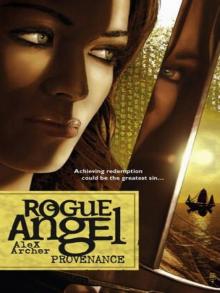 Provenance
Provenance Blood Cursed
Blood Cursed Fury's Goddess
Fury's Goddess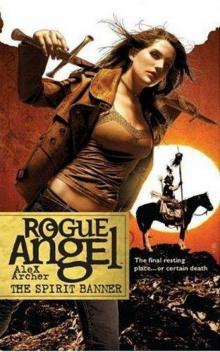 The Spirit Banner
The Spirit Banner Footprints
Footprints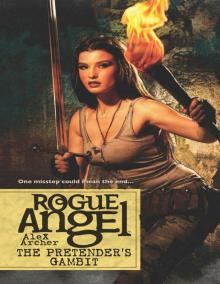 The Pretender's Gambit
The Pretender's Gambit Rogue Angel: The Lost Scrolls
Rogue Angel: The Lost Scrolls Staff of Judea
Staff of Judea Rogue Angel 55: Beneath Still Waters
Rogue Angel 55: Beneath Still Waters The Mortality Principle
The Mortality Principle Warrior Spirit
Warrior Spirit Paradox
Paradox Tear of the Gods
Tear of the Gods Forbidden City
Forbidden City River of Nightmares (Rogue Angel)
River of Nightmares (Rogue Angel) Rogue Angel: The Secret of the Slaves
Rogue Angel: The Secret of the Slaves Destiny
Destiny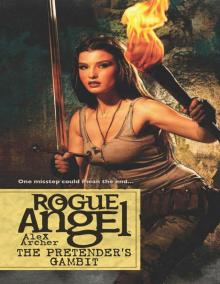 Rogue Angel 51: The Pretender's Gambit
Rogue Angel 51: The Pretender's Gambit Celtic Fire
Celtic Fire Rogue Angel 54: Day of Atonement
Rogue Angel 54: Day of Atonement Day of Atonement
Day of Atonement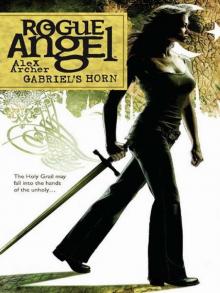 Rogue Angel: Gabriel's Horn
Rogue Angel: Gabriel's Horn Grendel's Curse
Grendel's Curse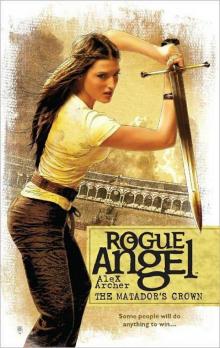 The Matador's Crown
The Matador's Crown Rogue Angel: The Chosen
Rogue Angel: The Chosen The Other Crowd
The Other Crowd Seeker’s Curse
Seeker’s Curse Rogue Angel 52: Death Mask
Rogue Angel 52: Death Mask The Golden Elephant
The Golden Elephant Blood Cursed (Rogue Angel)
Blood Cursed (Rogue Angel) Celtic Fire (Rogue Angel)
Celtic Fire (Rogue Angel)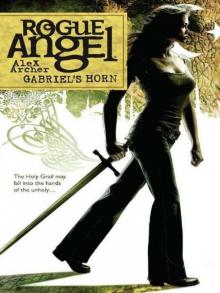 Gabriel's Horn
Gabriel's Horn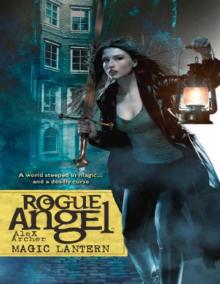 Magic Lantern (Rogue Angel)
Magic Lantern (Rogue Angel) God of Thunder
God of Thunder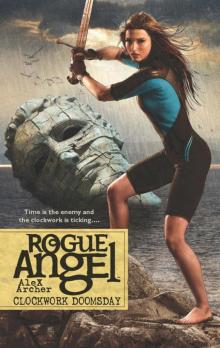 Clockwork Doomsday
Clockwork Doomsday The Bone Conjurer
The Bone Conjurer Treasure of Lima
Treasure of Lima The Soul Stealer
The Soul Stealer The Dragon’s Mark
The Dragon’s Mark Restless Soul
Restless Soul Rogue Angel: God Of Thunder
Rogue Angel: God Of Thunder Rogue Angel 49: The Devil's Chord
Rogue Angel 49: The Devil's Chord Death Mask
Death Mask Rogue Angel 46: Treasure of Lima
Rogue Angel 46: Treasure of Lima Swordsman's Legacy
Swordsman's Legacy The Oracle's Message
The Oracle's Message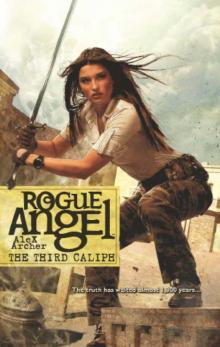 The Third Caliph
The Third Caliph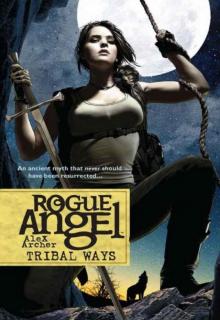 Tribal Ways
Tribal Ways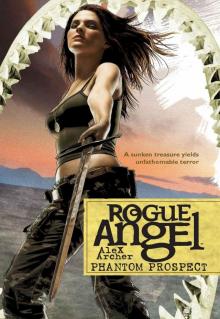 Phantom Prospect
Phantom Prospect Rogue Angel 50: Celtic Fire
Rogue Angel 50: Celtic Fire Library of Gold
Library of Gold Rogue Angel 53: Bathed in Blood
Rogue Angel 53: Bathed in Blood Sacred Ground
Sacred Ground The Devil's Chord
The Devil's Chord Serpent's Kiss
Serpent's Kiss The Vanishing Tribe
The Vanishing Tribe Sunken Pyramid
Sunken Pyramid Sunken Pyramid (Rogue Angel)
Sunken Pyramid (Rogue Angel)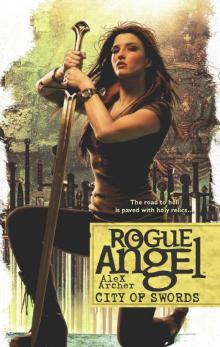 City of Swords
City of Swords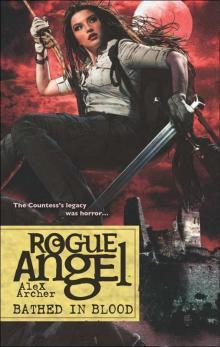 Bathed in Blood
Bathed in Blood The Lost Scrolls
The Lost Scrolls The Babel Codex
The Babel Codex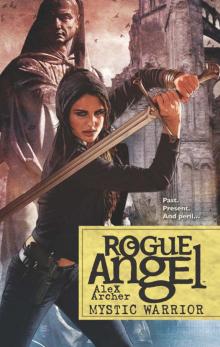 Mystic Warrior
Mystic Warrior Eternal Journey
Eternal Journey Beneath Still Waters
Beneath Still Waters Solomon's Jar
Solomon's Jar Beneath Still Waters (Rogue Angel Book 55)
Beneath Still Waters (Rogue Angel Book 55) Cradle of Solitude
Cradle of Solitude Secret of the Slaves
Secret of the Slaves River of Nightmares
River of Nightmares Polar Quest
Polar Quest False Horizon
False Horizon